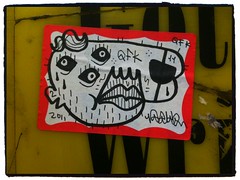
I am running, and embarrassed: if you run in a suit, you can't help but look a fool. Don't look at anyone; pretend they are not there. That's the trick. The station steps test my legs. I'm not fit enough for this, not at any time of day.
When I reach the top the station clock says 7:59:04 and my train is the 7:58. The platform is empty. Everyone else made it.
The next train is not due for ten minutes. When I try to double check the time I find I have forgotten my watch. Perfect. Overhead, the clock flicks through what digits it can. The display is decrepit and cannot relate the seconds that involve sixes or sevens. You have to figure those out for yourself. I am staring at it so absently that I do not notice when, attempting to indicate 8:01:27, it stops.
The first concerned face is of a tall, bald man standing under the clock. His eyes meet those of a matronly woman with fierce red hair standing beside him. They connect because they have been sharing a pastime: looking at their watches and then at the station clock, both of which have stopped.
Someone says something. Soon after, everyone says something. The guy in the coffee kiosk, in a position of unexpected authority, says his watch has stopped too. Questions fly around. The radio that plays me songs I don’t know and adverts I hate each morning continues to do its worst. The DJ is excited about the song he is going to play next. He is excited about all the songs, every last one of them. Nothing else has changed. It is only the clocks.
My shoes are dirty, I see now. Not just scuffed after my run but actually dirty. Mud smears the inside of each of them. Funny I should notice when there is something happening on the platform to hold my attention, but there it is. Did that happen this morning, or last night? I wasn’t out late, and it was still light when I came home. I would have noticed. But how did it happen this morning? There’s nowhere on my journey this could happen. Bizarre. I think that there must be a way I can clean this up without anyone noticing. I look around and realise I am wrong. There is no way. All of a sudden, people are noticing everything.
“I have to get to work.” The voice of the girl talking to me is slightly pleading. She looks young enough that I am surprised she is late for work rather than school. I don’t know why she has picked me to speak to. I don’t even serve coffee.
“I’m late already,” she says, “I can’t wait here all day.” She looks past me, down the track, craning her neck. I turn to do the same. No train is visible, and you can see them coming from a long way off. I have been here longer than ten minutes, I am sure of it.
A railway employee walks along the platform. The red-haired woman grabs him and demands to know what is happening. He shrugs. “Clock’s a piece of junk,” he says.
“And our watches? Where’s the train?” the girl asks.
Another shrug. He looks at the electronic departures board next to the clock. “No reported delays,” he says, and disappears.
Whispers and then talk. Everyone is running late; lots of us were running late before this and now we are never going to make it. There are presentations to give; there are meetings to attend. There are papers that need finishing by 10 and if they aren’t written then there’s no point in going to work at all, not today, not any day after it.
“You must be late,” the girl says. She sounds very certain and I wonder why.
“I am now,” I say. My answer makes me laugh. Sorry I’m late, boss, but it’s the trains and the clocks that did it. It’s time itself that’s responsible, there’s nothing a humble commuter can do about that.
“I’m so late,” the girl says, and looks down the line again, narrowing her eyes. “They’re going to fire me, I know it. I can’t get away with this again.”
I nod sympathetically. “There’s nothing you can do,” I say, trying to cheer her up. What I say registers, but I don’t think I succeed.
Phones don’t work. People try them again and again, but it doesn’t help. They tell each other they can’t make calls or send messages and then that the clocks on their displays have stopped. Because so many expressions ask me to, I try mine; it is the same. The tall man starts doing a Sudoku on his phone instead. He’s pretending to be concerned about all this, but I can tell the truth is otherwise. I think he might be on to something.
The conversations become a constant hum. We stare down the tracks. They offer nothing.
“To hell with this,” the red-haired woman says. She’s trying to be angry but she’s scared now. She keeps looking at the station clock and her phone and gets more and more desperate each time. It’s stopped, I want to say, now stop yourself. You can’t make time move or trains come. You’re utterly helpless; enjoy it. But before I or anyone else can say anything she takes flight, running – as much as she is able – down the stairs towards the ticket hall.
She does not come back. Others drift away, the taboo broken by one and now open to universal dereliction. For those of us who remain, the anger eventually passes and so does the fear. I try to guess how long we’ve been there. An hour? Who could tell? The tall man finishes his Sudoku and starts another one. I can tell he is pleased. The girl gives up on me and starts talking to some others who look close to her age and they dance in front of the coffee kiosk, egged on by the proprietor, now transformed into a breakfast-time lothario. All these girls he sees for such a short period each day are now his for who knows how long, perhaps forever. The tunes spin and the girls dance and his sales go through the roof.
A kindly-looking, elderly lady I have not noticed before hands me some tissues. “You’ll need to wet them,” she says. I do not initially understand, but she winks at me and says “for your shoes.” Her smile is wide and conspiratorial, and I am glad to return it. In full view of anyone who might care to look, I wipe the dirt away. Much better. If I were going to work, I would be well prepared.
As if recalling an amusing old habit, I look up at the station clock. 8:01:27. No change there, only beneath it. I can feel an enormous smile on my face, put there by I am not quite sure what. And to think only a second before this I was tired, irritated and bored by the day ahead.
I sit down on the platform edge. The clock is behind me. The others will tell me if it moves; surely one of them will notice eventually. I look across the lines and see things I have not seen before: the trees that lean out over the tracks, growing around the passing trains; the steady whirl of business in the town centre, deliveries being made and received, uniformed staff hurrying to work; the way the people and the rustling wind change the picture subtly but constantly.
Yes, I am sad when it happens. I am the first one to see it and the first one to say it. “Train,” I call out. “The train is coming.”
I stand up. It is the same train as every morning, and it feels like the end of the world.
Robert Long lives in Romford, England. He has had work published by the Muscle & Blood Literary Journal; Bards & Sages Quarterly and the Terminal Earth anthology amongst others, and has recently finished work on a novel. More information about this writing can be found here.
Photo by Adam Lawrence.
Street art by Rake of the Quite Frankly Krew and Almost Famous respectively.
"Holy Ghost/Gold Coast" comes from the new solo album by Chicago's Will Phalen.


Great story, really well written. :thumbup:
ReplyDeleteWord. We agree.
ReplyDelete